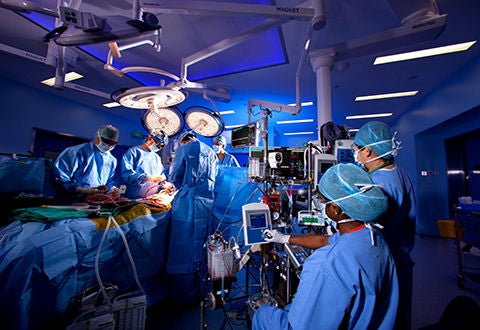
More than 2,000 heart patients from around the world, including Singaporeans, are taking part in the largest-ever cardiac surgery trial.
The trial, which started recruitment in 2003, is in its current phase in which tests have begun. Some results can be expected within 18 months.
Called Surgical Treatments for Ischaemic Heart Failure (Stich), the trial has 2,136 patients worldwide, with 10 per cent from Asian countries.
In Singapore, the National Heart Centre (NHC) recruited 19 patients for the trial.
Dr Chua Yeow Leng, senior consultant at the NHC, who initiated the project here, said the last similar study, the Coronary Artery Surgery Study, was done in the 1970s.
"That study had a predominantly Caucasian population, which is not representative of a global study," he said.
Drugs and surgical procedures used have also evolved.
"This is a landmark study because it focuses on the weakest patints, with the highest risk of complications," Dr Kenneth Ng, consultant cardiologist with Tan Tock Seng Hospital, which has several patients involved in Stitch.
"Surgeons today don't have the data to say, 'Here's how much you'll benefit from each option available,' for example," he said.
Worldwide, heart failure causes 300,000 deaths a year. Heart disease is also, after cancer, the most commonest cause of death in Singapore.
About three-quarters of heart failures are attributed to ischaemic heart disease, when blockages in the arteries reduce blood flow to the heart, and damaged heart muscles add to complications of an enlarged heart.
One new procedure being studied in the trial is Surgical Ventricular Restoration (SVR) - a complicated "nip and tuck" to get this compartment in the heart, the ventricle, down to its normal fist-size.
"It's a complicated surgery, which only the most experienced surgeons should attempt," said the head of the National University Hospital's Cardiac Department, Dr Tan Huay Cheem.
"The new clinical trials will make clear under what conditions SVR will meet our aim of prolonging and improving a patient's life."
Stitch evaluates the merits and shortcomings of each type of treatment available, including SVR and combinaIions of surgical operations.
"We're comparing patients' response to treatments using medication alone, bypass surgery with or without SVR, or combinations of these prescriptions," said NHC's Dr Chua.
"We chose patients whom we expect to do well with at least two of these different options, and based on the trial's needs, we will pick one choice for the patient," he added.
Singapore was the first Asian country to join the Stich trial in 2004. Research has already begun with those patients who have consented to take part in Singapore.
Four months after signing up, and every eight to 12 months after, they are checked for their condition, with fitness tests including the distance they can walk in six minutes and scans like cardiovascular magnetic resonance and echocardiogram tests.
Participation in the trial, which is funded by the National Institutes of Health in the United States and driven by the Duke Clinical Research Institute, is expected to save each patient up to US$6,000(S$9,000) by the time it is completed in five years.
Analysis of initial findings have begun at Duke and early results are expected in 2009.
Source: The Straits Times © Singapore Press Holdings Limited. Permission required for reproduction.













 Get it on Google Play
Get it on Google Play